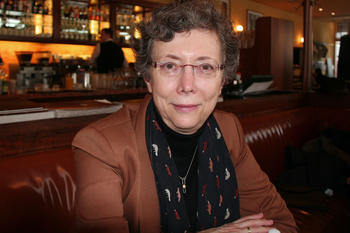Sabbatical in Dahlem
Islamic and Jewish studies scholar Sarah Stroumsa studies the shared intellectual history of Jews, Muslims, and Christians in the Islamic Middle Ages
Apr 25, 2013
Sarah Stroumsa is a scholar of Islamic studies and Jewish studies. She is currently conducting research at Freie Universität Berlin as an Alexander von Humboldt Research Award winner.
Image Credit: Verena Blindow
Research transcends boundaries. This is especially true of the well-known professor of Islamic and Jewish studies Sarah Stroumsa, who is currently spending a year as an Alexander von Humboldt program research fellow at the research unit headed by Professor Sabine Schmidtke at Freie Universität Berlin. An Israeli whose family spoke German and who studied not only Jewish philosophy, but also Arabic language and literature, Stroumsa, a former rector of the Hebrew University of Jerusalem, is used to encountering resistance – but also to overcoming it.
The 63-year-old scholar’s area of research encompasses the history of ideas as well as that of philosophy and theology in the Islamic world in the medieval era, between the 8th and 13th centuries. “We are very lucky that a relatively large number of documents from this period survive, and continue to surface” Stroumsa says. “This gives us insight into the development of Jewish, Muslim, and Christian intellectual history.” This wealth of material, she says, gives scholars of Islamic studies sufficient room for their research. In her research, Stroumsa concentrates on the works and thought of Jewish, Muslim, and Christian scholars – which, she says, are interconnected and cannot be considered in isolation.
In her current project, entitled “Thinkers of ‘This Peninsula’: New Perspectives in the Philosophy of al-Andalus,” Stroumsa focuses on the Iberian Peninsula under Islam in the Middle Ages. Working in cooperation with scholars from the “Intellectual History of the Islamicate World” research unit, which was founded over two years ago by Sabine Schmidtke, a professor of Islamic Studies at Freie Universität, Stroumsa searches for new insights regarding the great philosophers of Islamic Spain. “It is important to work together in teams in order to bring together the knowledge of individuals,” Stroumsa says, adding that Berlin is an especially suitable location for this kind of work – and not only because of the multicultural character of the city itself.
“Working in the research unit gives me an opportunity to work closely with scholars and researchers who I would not otherwise be able to meet in Israel due to the Israeli-Palestinian conflict,” Stroumsa says. Indeed, fostering academic exchange across political boundaries is another of her priorities. To that end, more than five years ago Stroumsa teamed up with a Palestinian colleague to launch an online platform for sharing information across barriers (http://www.intellectualencounters.org).
To Stroumsa, the main rewards of her research work are the intellectual challenge and enjoyment of the work itself. It is in the nature of things that working simultaneously with Muslim and Jewish history in the Middle East becomes politicized, she says. “Some opponents of the Israeli government call for an ‘academic boycott’ in order to isolate Israel politically, but I believe a university’s chief mission is to build bridges.”

